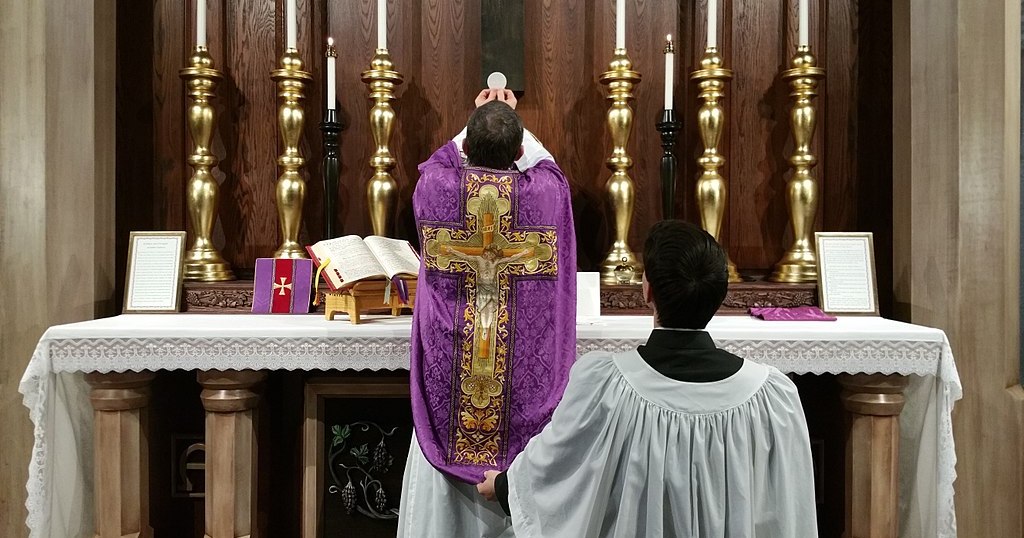A few months ago I updated my twitter profile with the label “Traditional Catholic.” Although I started attending a Latin Mass parish back in 2011 and have had “traditional” leanings for even longer, I have hesitated using that label on myself for a long time. I hesitated for two reasons.
Labels Are Not Universal
The first is that putting a label before the word “Catholic” is by necessity dividing Catholics into multiple groups. And if you know the meaning of the term “Catholic” (“universal”), you’ll know that any label before the word is essentially oxymoronic. It should be an instinct of every Catholic to want to be “just Catholic.” However, we unfortunately live in an age when saying we are “just Catholic” is a luxury we can’t indulge in. Due the confusion that has reigned throughout the Church the past sixty years—from top to bottom—it is hard to say anymore what it means to be “just Catholic”. These days it can range anywhere from a daily Latin Mass-going Catholic to a Catholic who only attends Mass a few times a year. There’s a lot more of the latter than the former, so does that mean the lax Catholics are the true “just Catholics”? The term “Catholic” has little unifying effect anymore.
Further, anyone who says that he is “just Catholic” today means that to be Catholic is to be like him, which means to not be like a whole bunch of other Catholics. So even saying you are “just Catholic” is as dividing as any label might be. And it doesn’t really help the conversation, for it sadly says almost nothing about what you believe or practice. I long for a day when being “just Catholic” has universal meaning, but that day is not today. For the foreseeable future, every Catholic is a “labeled” Catholic.
Traditional Stereotypes
The second reason I resisted claiming the label “traditional Catholic” is that I long had the same impression many people have of traditional Catholics: grumpy, bitter Catholics who hate the Ordinary Form of the Mass, believe Vatican II to be invalid, and think every pope since Pius XII is a raging heretic. Even after I met and interacted in person with many traditional Catholics and saw this stereotype landed far from the mark, I had a hard time shaking the impression in my mind. But while I’ve found that, like any sociological grouping, traditional Catholics have people on the extremes, those extremes should not define it.
Most traditional Catholics I know are simply Catholics who care very much about the state of the Church and are willing to question many of the reforms that came in the wake of Vatican II. They prefer the Extraordinary Form of the Mass (EF, aka Traditional Latin Mass) not for simple aesthetical reasons, but because they believe it is the best way to worship God. They question many of the Church’s ecumenical and inter-religious outreaches not because they hate Protestants and other non-Catholics, but because they wonder if those outreaches ever result in people drawing closer to Christ in the Catholic Church. In general, they lament that the Church’s acceptance of modernity has weakened her ability to proclaim the Good News of Jesus Christ.
Loving “X” Doesn’t Mean Hating “Y”
Yet the label “traditional Catholic” is still fraught with hidden meanings for many people. Doesn’t this mean you reject the Ordinary Form (OF, aka the Novus Ordo)? Not at all. I believe the OF is a valid Mass and that many graces are possible through it. The most solid Catholic family I know, in fact, attends the OF, and I know countless other OF-attending Catholics who live good and holy lives. But while I believe the OF to be valid and a means of grace, I still believe the EF is a better form of worship. To use a baseball analogy, if one team finishes 100-62 and the other finishes 95-67, the second place team is very good, but it’s still inferior to the first place team.
The other big topic that can’t be avoided whenever the term “traditional Catholic” comes up is Vatican II. Doesn’t being a traditional Catholic mean you reject Vatican II as a legitimate ecumenical council? Again, no. What it means is that you are willing to entertain the thought that just perhaps the wholesale devastation seen in the Church since the 1960’s might be related to the Council and its aftermath.
It’s true that there are traditional Catholics who would be far more harsh than I when it comes to the OF Mass, Vatican II, and the whole post-Vatican II project. But even though a label narrows the field as to who it includes, it doesn’t mean there isn’t some legitimate diversity within that label.
I don’t like labeling Catholics, but it is necessary today. And since I prefer the Latin Mass and believe the post-Vatican II experiment to be largely a failure, I gladly label myself a traditional Catholic, no matter what undue stereotypes that might foster.

